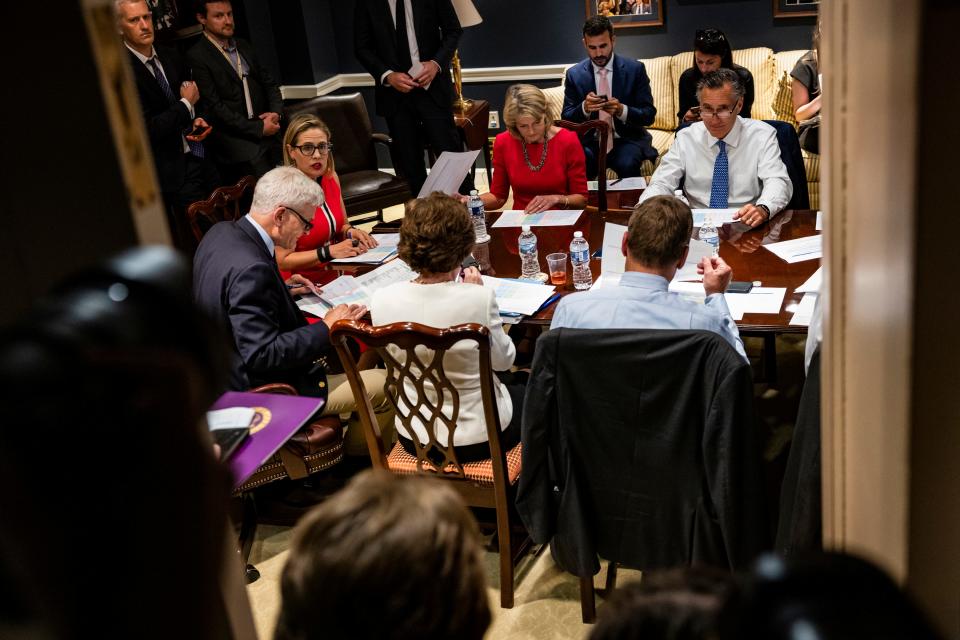$1.2 trillion bipartisan infrastructure deal gaining steam on Capitol Hill
- Oops!Something went wrong.Please try again later.
- Oops!Something went wrong.Please try again later.
- Oops!Something went wrong.Please try again later.
- Oops!Something went wrong.Please try again later.
WASHINGTON – Momentum for a bipartisan deal on infrastructure grew Wednesday when 10 more senators endorsed the framework of a $1.2 trillion proposal first unveiled last week as a counter to a larger package the White House is pushing.
The bipartisan proposal now has the backing of a significant bloc of centrist lawmakers – 10 Republicans and 10 Democrats – and has emerged as the best opportunity for President Joe Biden to reach a broad deal with Congress on a sweeping plan to modernize America's deteriorating transportation systems such as rail, bridges and waterways.
“We support this bipartisan framework that provides an historic investment in our nation’s core infrastructure needs without raising taxes." the group said in a statement. "We look forward to working with our Republican and Democratic colleagues to develop legislation based on this framework to address America’s critical infrastructure challenges.”

Last week, a group of 10 senators laid out a broad framework: It would not increase the corporate tax rate, which Biden had proposed raising from 21% to 28%, nor would it hike the 18.4-cent federal per-gallon gas tax, although annual increases "indexed" to inflation could be included.
But it would include hundreds of billions in new revenue Biden has been asking for to address the nation's crumbling bridges, aging waterways and inadequate broadband network.
Those 10 senators were: Democrats Joe Manchin (West Virginia), Jeanne Shaheen (New Hampshire), Kyrsten Sinema (Arizona), Jon Tester (Montana) and Mark Warner (Virginia); and Republicans Bill Cassidy (Louisiana), Susan Collins (Maine), Lisa Murkowski (Alaska), Rob Portman (Ohio) and Mitt Romney (Utah).
More: Democrats prepared to move forward alone while moving ahead with 'two-track' infrastructure plan
On Wednesday, they were joined by 10 more: Democrats Chris Coons (Delaware), Maggie Hassan (New Hampshire), John Hickenlooper (Colorado), and Mark Kelly (Arizona); and Republicans Richard Burr (North Carolina), Lindsey Graham (South Carolina), Mike Rounds (South Dakota), Thom Tillis (North Carolina), and Todd Young (Indiana). Angus King, an independent from Maine who caucuses with the Democrats, also endorsed the plan.
Senate Democrats who support the infrastructure framework briefed White House officials Wednesday.
White House deputy press secretary Andrew Bates called the briefing “productive and encouraging.”
“They look forward to briefing the president tomorrow after his return to the White House and continuing to consult with Senators and Representatives on the path forward," Bates said.
Many details of the proposal have not been released, but it would not include "soft" infrastructure such as climate change and housing, which Biden had called for in his original $2.25 trillion American Jobs Act.
The president has slowly reduced his demand on the price tag of his proposal to $1.4 trillion, but the two sides remain hundreds of billions apart on how much new revenue would be needed to finance their plans.
Even with Wednesday's development, Democrats are continuing to pursue a "two-track" strategy to enact Biden's American Jobs Plan, which would pour tax dollars not only into highways, bridges and airports but also broadband, electric vehicle charging stations and new housing while accelerating the nation's conversion from fossil fuels to clean energy.
On one hand, Democrats said they would negotiate with Republicans on a bill that focuses on traditional transportation. If a deal can't be reached, Democrats would fold those programs into a larger climate bill using budget reconciliation, a parliamentary strategy that bypasses the filibuster process and allows a simple majority to pass legislation.
Majority Leader Chuck Schumer, D-N.Y., met with members of the Budget Committee Wednesday to lay out the process for reconciliation. He characterized the closed-door meeting as "a great first discussion" and told reporters he still expects infrastructure bills to reach the Senate floor next month,.
Biden told reporters Wednesday he hadn’t reviewed the offer from the bipartisan group as he boarded Air Force One in Geneva after meeting with Russian President Vladimir Putin at a bilateral summit.

“I honestly haven’t seen it. I don’t know what the details are. I know that my chief of staff thinks there’s some room that there may be a means by which to get this done,” Biden said.
He added that he’s also aware Sen. Schumer, D-N.Y., and House Speaker Nancy Pelosi, D-Calif., have moved forward on reconciliation as an option. “So, I'm still hoping we could put together the two bookends here.”
This article originally appeared on USA TODAY: $1.2T Infrastructure deal gains bipartisan support among senators

